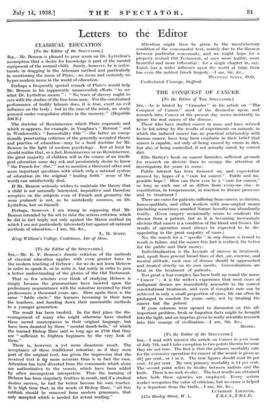Letters to the Editor
CLASSICAL EDUCATION
[To the Editor of the SPECTATOR.] SIR,—Mr. Benson is pleased to pour scorn on Dr. Lyttelton's assumption that a desire for knowledge is part of the mental equipment of the normal child. Surely, however, he is unfor- tunate in dragging in the Athenian method and particularly in mentioning the name of Plato,—no mean and certainly no hyper-modern name in the world of education.
Perhaps a frequently quoted remark of Plato's would help Mr. Benson in his (apparently unsuccessful) efforts " to see what Dr. Lyttelton means " : " No trace of slavery ought to mix with the studies of the free-born man. For the constrained performance of bodily labours does, it is true, exert no evil influence on the body ; but in the case of the mind, no study pursued under compulsion abides in the memory." (Republic 636 E.) The doctrine of Reminiscence which Plato expounds and which re-appears, for example, in Vaughan's " Retreat " and in Wordsworth's " Immortality Ode "—the latter an excep- tionally penetrating criticism of the generally accepted theory and practice of education—may be a hard doctrine for Mr. Benson in the light of modern psychology. But at least he should realize that, as a fact, Reminiscence or no Reminiscence, the great majority of children will in the course of an intelli- gent education some day ask and passionately desire to know "the French for ' Oui,' " not to mention a thousand other and more important questions with which only a rational system of education (in the original " leading forth " sense of the word) can satisfactorily deal.
If Mr. Benson seriously wishes to maintain the theory that a child is not naturally interested, inquisitive and therefore receptive on the subjects even of French and geometry the onus probandi is not, as he mistakenly assumes, on Dr. Lyttelton, but on himself.
Perhaps, however, I am wrong in supposing that Mr. Benson intended by his wit to raise the serious criticism which he did in fact imply not only against the Mason method (in which I am not particularly interested) but against all rational methods of education.—I am, Sir, &c.,




































 Previous page
Previous page